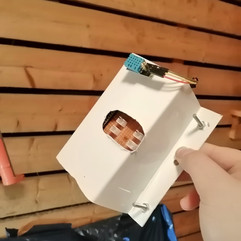Automated observatory health check
- Ville Puoskari

- Sep 21, 2021
- 2 min read
When I visit my observatory I often check all sorts of bits and pieces to see if they are working - for example heaters that keep the tracks of the roof free from ice and snow. I wanted to automate this to be able to troubleshoot things remotely, main goal was to know if the device is receiving power or not by measuring its voltage or temperature. To achieve this I made a code for an Arduino Nano. After a bit of researching I decided to use waterproof DS18B20 temperature sensors, these sensors are very handy when you want to get multiple readings because they use 1-wire -interface. This means that all of the data cables can be connected to a single pin on the microprocessor. I also wanted to get humidity readings from the electrical cabinet so I used a DHT11 temperature / humidity sensor to get that data. Then I added three voltage detection modules to get information on motor voltage and relay positions on my future upgrades to the roof automation but you can hook any device on them as long as they dont exceed the specified maximum voltage of the sensor module that you are using.
After a bit of soldering I ended up with this, I sandwiched the components between two PCB:s to protect the connections inside. I also made a shell for the finished project out of sheet metal because this was placed inside an electrical cabinet so I dont accidentally disconnect something if Im fiddling with other devices inside it. Only the temperature / humidity sensor is mounted on top to prevent heat from the Arduino from interfering with the measurements.
The data from Arduino can be read through serial monitor, in my case it looks like this. You can add as many DS18B20 temperature sensors to the same signal pin as you like. Just make sure you use a 4.7 kOhm resistor between signal and VCC pins to act as a pull up resistor. For physical connections to the sensors I used JST XH connectors. I highly recommend them because they seem to create a solid connection that can be disconnected with ease, also they are quite small so they dont eat up too much space on the PCB.

The Arduino pins for this code are displayed in the code and as a text file, just open it in Arduino IDE to do your own version. You will also need to install DallasTemperature, OneWire and DHT libraries from Arduino Library to make it work. Feel free to customize it to suit your own needs! You can download this project here.











Comments